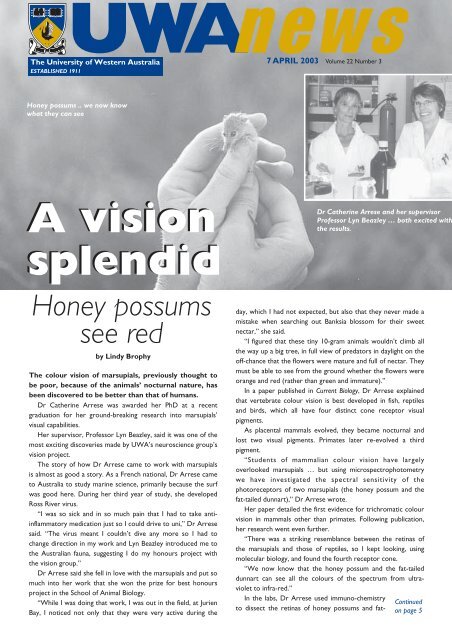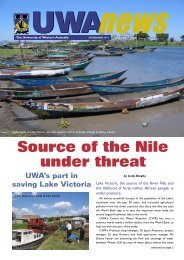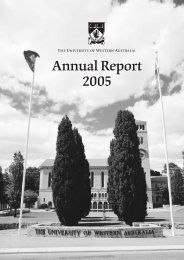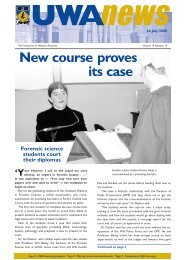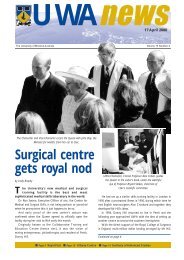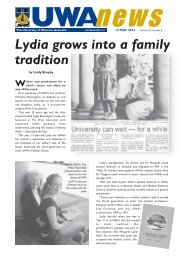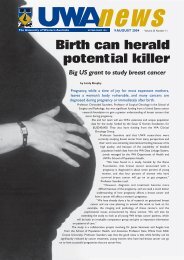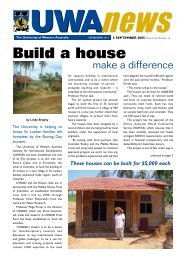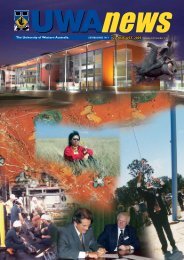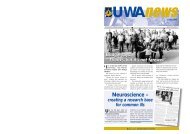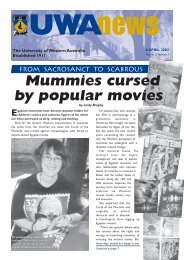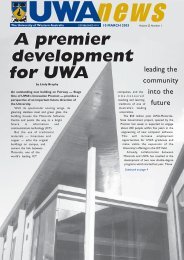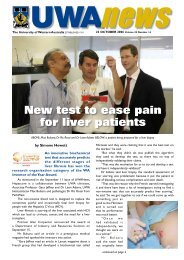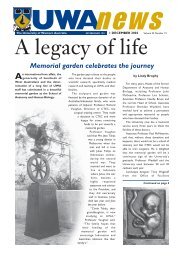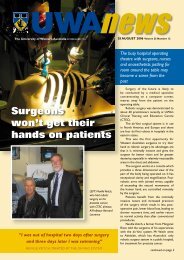7 Apr: Vol 22, #3 - Publications Unit - The University of Western ...
7 Apr: Vol 22, #3 - Publications Unit - The University of Western ...
7 Apr: Vol 22, #3 - Publications Unit - The University of Western ...
Create successful ePaper yourself
Turn your PDF publications into a flip-book with our unique Google optimized e-Paper software.
UWA<strong>The</strong> <strong>University</strong> <strong>of</strong> <strong>Western</strong> AustraliaESTABLISHED 1911news7 APRIL 2003 <strong>Vol</strong>ume <strong>22</strong> Number 3Honey possums .. we now knowwhat they can seeA visionDr Catherine Arrese and her supervisorPr<strong>of</strong>essor Lyn Beazley … both excited withthe results.splendidHoney possumssee redIn the labs, Dr Arrese used immuno-chemistryto dissect the retinas <strong>of</strong> honey possums and fatbyLindy Brophy<strong>The</strong> colour vision <strong>of</strong> marsupials, previously thought tobe poor, because <strong>of</strong> the animals’ nocturnal nature, hasbeen discovered to be better than that <strong>of</strong> humans.Dr Catherine Arrese was awarded her PhD at a recentgraduation for her ground-breaking research into marsupials’visual capabilities.Her supervisor, Pr<strong>of</strong>essor Lyn Beazley, said it was one <strong>of</strong> themost exciting discoveries made by UWA’s neuroscience group’svision project.<strong>The</strong> story <strong>of</strong> how Dr Arrese came to work with marsupialsis almost as good a story. As a French national, Dr Arrese cameto Australia to study marine science, primarily because the surfwas good here. During her third year <strong>of</strong> study, she developedRoss River virus.“I was so sick and in so much pain that I had to take antiinflammatorymedication just so I could drive to uni,” Dr Arresesaid. “<strong>The</strong> virus meant I couldn’t dive any more so I had tochange direction in my work and Lyn Beazley introduced me tothe Australian fauna, suggesting I do my honours project withthe vision group.”Dr Arrese said she fell in love with the marsupials and put somuch into her work that she won the prize for best honoursproject in the School <strong>of</strong> Animal Biology.“While I was doing that work, I was out in the field, at JurienBay, I noticed not only that they were very active during theday, which I had not expected, but also that they never made amistake when searching out Banksia blossom for their sweetnectar,” she said.“I figured that these tiny 10-gram animals wouldn’t climb allthe way up a big tree, in full view <strong>of</strong> predators in daylight on the<strong>of</strong>f-chance that the flowers were mature and full <strong>of</strong> nectar. <strong>The</strong>ymust be able to see from the ground whether the flowers wereorange and red (rather than green and immature).”In a paper published in Current Biology, Dr Arrese explainedthat vertebrate colour vision is best developed in fish, reptilesand birds, which all have four distinct cone receptor visualpigments.As placental mammals evolved, they became nocturnal andlost two visual pigments. Primates later re-evolved a thirdpigment.“Students <strong>of</strong> mammalian colour vision have largelyoverlooked marsupials … but using microspectrophotometrywe have investigated the spectral sensitivity <strong>of</strong> thephotoreceptors <strong>of</strong> two marsupials (the honey possum and thefat-tailed dunnart),” Dr Arrese wrote.Her paper detailed the first evidence for trichromatic colourvision in mammals other than primates. Following publication,her research went even further.“<strong>The</strong>re was a striking resemblance between the retinas <strong>of</strong>the marsupials and those <strong>of</strong> reptiles, so I kept looking, usingmolecular biology, and found the fourth receptor cone.“We now know that the honey possum and the fat-taileddunnart can see all the colours <strong>of</strong> the spectrum from ultravioletto infra-red.”Continuedon page 5
2 UWAnewsVCariousthoughts …“QualityAssurance”<strong>The</strong>se are sombre days. Not only a war in Iraq,involving Australia, but an international environment <strong>of</strong>instability and regional conflicts. <strong>The</strong> world economy isailing, and bearish equity markets deliver declininginvestment returns — which negatively affect not onlyindividuals but institutions such as UWA.We have the resources and capacity to cover such effects in theshort term. But we now have to consider our future with thenew global realities in mind.What is the best strategy in such an environment? I believe it iscritical that we keep to our fundamentals in mission, processesand excellence. Quality institutions, like quality share portfolios,will ultimately succeed over the longer term. Quick fixes andhasty strategies can only damage institutions <strong>of</strong> essentialexcellence.UWA’s fundamentals remain sound. Our performance in2002-3 is still to be celebrated. Our student intake reflectshigher proportions <strong>of</strong> top state school leavers each year and wenow have the highest cut-<strong>of</strong>f scores in Australia. Our researchincome is outstanding. Our overall budget growth from allsources – except the investment portfolio –– was again nearly8 per cent. Transnational students and programs grewexceptionally strongly. Industry partnerships — such as withMotorola in UWA’s Innovation Precinct — became a model <strong>of</strong>such strategies. Our community service — through the PerthInternational Arts Festival, the Press, the gallery, museums,drama and music and sport — all reveals a remarkableengagement with society. And we continue to receiveexceptional applications for academic and pr<strong>of</strong>essional staffappointments.A culture <strong>of</strong> excellence exists, and such cultures contain withinthem a commitment to future developments, an awareness <strong>of</strong>the challenges we must take up. Our unrestricted income mustgrow even faster. We must build the post-graduate researchUWAnewsEDITOR/WRITERLindy BrophyTel.: 9380 2436 Fax: 9380 1192 Email: lindy.brophy@uwa.edu.auEDITOR-IN-CHIEFColin Campbell-FraserTel: 9380 2889 Fax: 9380 1020 Email: ccampbell@admin.uwa.edu.auDesigned and typeset by <strong>Publications</strong> <strong>Unit</strong>, UWAPrinted by UniPrint, UWAUWAnews online: www.publishing.uwa.edu.au/uwanews/school, with more research students. Greater success in the bigcollaborative research centre funding programs is also vital.<strong>The</strong>re is considerable opportunity to expand our pr<strong>of</strong>essionalmasters programs, and to enhance our transnational initiativeswith students <strong>of</strong> excellence from China.In 2003 there will be two critical external factors where we canapply our commitment to quality and innovation.One major opportunity will exist in the way we respond to theoutcomes <strong>of</strong> the “Nelson-Crossroads Review” <strong>of</strong> highereducation funding and policy. Our mission and our capacityshould place us in a strong position to advance UWA with along-term strategy for growth and quality initiatives.<strong>The</strong> second is the Quality Audit itself in August. It is easy to becynical about such national government processes. But theAustralian Universities Quality Agency system can do much toassure good international standards for our whole sector, withits self-accrediting public universities. It also has the potential,through both self-evaluation and external critique, to ensurethat excellence is enhanced. We enter the quality audit processin the positive spirit that seeks out ways <strong>of</strong> embeddingexcellence in our teaching, research and external engagement.And, indeed, extending that excellence in both how we dothings and in the UWA outcomes.As an innocent distraction from global gloom I recently read anexcellent study <strong>of</strong> the origins <strong>of</strong> key words in our culture. One<strong>of</strong> these I noted was quality — which I discovered came fromthe ancient Greeks, where it was used to denote the ‘whatness’<strong>of</strong> things, a kind <strong>of</strong> irreducible reality. <strong>The</strong> Romans apparentlygave the term the ‘modern’ spin — <strong>of</strong> excellence in outcomesor value etc.That “whatness” <strong>of</strong> UWA — our core values, commitmentsand vision –– will be the key to our endurance anddevelopment in these troubled and unstable times.‘Quality will out’, as they say.Pr<strong>of</strong>essor Deryck SchreuderVice-Chancellor and Presidentvc@acs.uwa.edu.auTHE UNIVERSITY OF WESTERN AUSTRALIA • 7 APRIL 2003
UWAnews 3From paddockto productivityBrightfuture foragriculturalindustry<strong>The</strong> new Dean <strong>of</strong> the Faculty <strong>of</strong> Natural and Agricultural Sciences,Pr<strong>of</strong>essor Alistar Robertson, is an internationally renowned ecologistwith interests in plant-animal interactions, ecosystems processes atland-water margins and the environmental imperatives foragriculture. He comes to UWA from Charles Sturt <strong>University</strong> wherehe was Director <strong>of</strong> the Johnstone Centre for Research in NaturalResources and Society.After 23 years studying ecological processes inaquatic systems, the new Dean <strong>of</strong> Natural andAgricultural Sciences caused some concern among thefaculty staff.“I think they were worried that I was going to change this intoa faculty <strong>of</strong> marine science!” laughed Pr<strong>of</strong>essor Alistar Robertson.“But they didn’t need to fear. My heart is on the land.”Pr<strong>of</strong>essor Robertson said he was brought up on a sheepfarm. “My Dad was getting fantastic prices in the 1950s. Hewould never have believed that sheep numbers in Australiawould have dropped by 10 per cent in the past five years.”But it is this sort <strong>of</strong> change that provides the challenges fornew generations <strong>of</strong> agricultural graduates, who are drivingresource management, who understand markets and who arefinetuning agricultural products for those markets.“Consumers are demanding environmentally creditedproducts. In France, you can pick up a piece <strong>of</strong> beef in asupermarket and take it to the customers’ computer and findout where it came from and what practices the farmer used toproduce it,” Pr<strong>of</strong>essor Robertson said. “And that system willeventually come to Australia.“Agricultural products will remain the country’s third highestexport sector (after oil and gas), bringing in 20 per cent <strong>of</strong> ourexport revenue, at least for the rest <strong>of</strong> this century,” he predicted.“Agriculture and associated areas make up a huge industry,with a lot <strong>of</strong> diverse jobs. <strong>The</strong> perception is that our graduatesare going to end up on the farm. But some <strong>of</strong> our graduateshave never even been on a farm. <strong>The</strong>y will end up somewherealong the supply chain or in a related service industry,” he said.Early in his term, Pr<strong>of</strong>essor Robertson said he was able toencourage one <strong>of</strong> the state’s top TEE students (with a TER <strong>of</strong>99.95) to enrol in natural resource management, rather thanmedicine.Pr<strong>of</strong>essor Alistar Robertson makes a distinctive figure on campuswith his flowing beard“We don’t usually get the 99-plus students but when we do,they realise what a good choice they’ve made and what amyriad <strong>of</strong> diverse employment and research opportunities areavailable to them.”He said the new, enlarged faculty would enhance its alreadyoutstanding reputation for research. “Forty per cent <strong>of</strong> ourfunding comes from the Grains Research and DevelopmentCorporation, so we are constantly working on betterproduction systems and new crop varieties.“But if we just go down the applied route, we will lose some<strong>of</strong> our knowledge base, so we will be keeping up the basicresearch as well.”Pr<strong>of</strong>essor Robertson has given up a research career to guidethe faculty’s research, teaching and learning. “I’m happy with mydecision, in fact, more than that, I’m excited about thepossibilities.“Our faculty can now <strong>of</strong>fer undergraduate courses andresearch at all levels in geology, zoology, botany and agricultureas well as in marine science and environmental science. Our mix<strong>of</strong> disciplines allows us to teach specialities, as well as interdisciplinarycourses that involve science, economics and socialperspectives.“My real challenge, as Dean, is to balance the basic scientificwith the commercial demands.”Another, lesser, challenge is to come up with more appealingnames for some <strong>of</strong> the Faculty’s courses.“I’m setting up a focus group, which includes some Year 12students, to advise me on this,” he said.THE UNIVERSITY OF WESTERN AUSTRALIA • 7 APRIL 2003
4 UWAnewsOSDS: Office <strong>of</strong> Shelda Debowski(at your) ServiceShelda Debowski … opening another chapter in her ‘eclectic’ careerMost UWA staff are familiar with the Centre for StaffDevelopment and the Centre for the Advancement <strong>of</strong>Teaching and Learning. <strong>The</strong>y even know about theEvaluation <strong>of</strong> Teaching <strong>Unit</strong>.But it seems that not everybody understands the interrelationshipsand how they all come together under theumbrella <strong>of</strong> Organisational and Staff Development Services(OSDS), along with additional support services.OSDS’s new Director, Pr<strong>of</strong>essor Shelda Debowski, hopes tochange that.“I want staff to recognise OSDS as a cohesive service andrecognise how it can help them,” Pr<strong>of</strong>essor Debowski said,quickly inventing her own spin on the acronym: OutstandingStaff Develop Superbly.She describes her career as eclectic. “Most people seem toget more and more specialised in a particular area,” she said.“But I constantly found myself developing across a number <strong>of</strong>boundaries within teaching, technology and organisationaldevelopment.”But with extensive experience in teaching, research andconsulting, Pr<strong>of</strong>essor Debowski believes her breadth <strong>of</strong>experience should prove to be an asset in her new role.She has a long history in academe. She started her workinglife as a teacher librarian, with a Bachelor <strong>of</strong> Arts and a Diploma<strong>of</strong> Teaching but was quickly recruited to lecture at the formerNedlands Teachers’ College, at the age <strong>of</strong> 24. A Bachelor <strong>of</strong>Education, Master <strong>of</strong> Education and PhD relating to onlinelearning and affective responses followed.She spent many years lecturing in library and informationservices at Edith Cowan <strong>University</strong> where, she says, teachingwas the institutional strength.“ECU was quite early in putting courses on-line and myteaching experience across a number <strong>of</strong> modes was stronglydeveloped there. I went to Murdoch <strong>University</strong>, as a seniorlecturer in management, to work more intensively in research.”While at Murdoch <strong>University</strong> she won a teaching fellowshipaward.“Murdoch <strong>of</strong>fered many opportunities for me, includingextensive roles in research leadership and management. I wasDirector <strong>of</strong> Research for the business school for four years,which was particularly valuable, and also operated in researchleadership roles at the faculty and university levels.“<strong>The</strong> business school had a very low research pr<strong>of</strong>ile when Iwent there, with very few people doing research. My leadershiprole related to establishing a stronger research community byintroducing policies and programs for research students andstaff, developing support for early career researchers, andbuilding a stronger collaborative research culture.“Over four years, we increased our research activecomplement to 40 staff by encouraging interaction and learningthrough developing a community <strong>of</strong> practice. I see these types<strong>of</strong> strategies as particularly critical in our changing tertiarycontext.”While at Murdoch, Pr<strong>of</strong>essor Debowski was nominated andshort-listed for a Teaching Excellence Award, nominated forsupervision excellence and won several teaching innovationgrants. She has also published several papers relating to teachingand learning.She has worked as a performance management consultant toindustry and has a strong interest in human resource servicesand their impact on organisational performance, particularly inthe influencing <strong>of</strong> culture and leadership practices.Pr<strong>of</strong>essor Debowski is currently getting to know key peoplethroughout the <strong>University</strong> and identifying the strengths <strong>of</strong>OSDS.“In particular, I’m asking about the service we are currently<strong>of</strong>fering and what, if any, are the barriers to staff taking whatthey learn back to the workplace?” she said.Her goals for OSDS include providing better consultancyservices to individual faculties and schools, better marketing <strong>of</strong>the services provided, building up collaborative research withother units within and outside the <strong>University</strong>, and creating amore integrated service which reflects the needs <strong>of</strong> bothacademic and general staff.THE UNIVERSITY OF WESTERN AUSTRALIA • 7 APRIL 2003
UWAnews 5Gravityresearchrewardedbut the search continuesOne <strong>of</strong> UWA’s — and the nation’s — most innovativephysicists has won the Clunies Ross National Scienceand Technology Award for 2003.Pr<strong>of</strong>essor David Blair was presented with the award, alongwith seven other national winners, in Melbourne recently.David Blair’s quest in search <strong>of</strong> gravity waves –‘ the drums <strong>of</strong>heaven’’– has created new businesses and inspired a generation<strong>of</strong> West Australian school children. He may yet be the first todetect these elusive waves, first predicted by Albert Einstein.Hundreds <strong>of</strong> millions <strong>of</strong> dollars are being spent in the globalrace to detect gravitational waves. Working with limitedresources, David Blair and his team at UWA are among theleaders.<strong>The</strong>ir gravity wave detector at Gingin, north <strong>of</strong> Perth, isattempting to detect movement as infinitesimal in size as is abillionth <strong>of</strong> an atom.Pr<strong>of</strong>essor Blair is now working with organisations acrossAustralia to develop still finer detectors using laser inferometry.<strong>The</strong> gravitational observatory is accompanied by a scienceand education centre, the Gravity Discovery Centre, where theteam is building the ‘Leaning Tower <strong>of</strong> Gingin’, to allow studentsto repeat Galileo’s classic gravity experiments at the leaningtower <strong>of</strong> Pisa.“I don’t know what difference the discovery <strong>of</strong> gravity waveswill make to humanity,” he said, “but Heinrich Hertz, thediscoverer <strong>of</strong> electromagnetic waves, could not have imaginedthe mobile phone and all the other devices <strong>of</strong> the electronicrevolution <strong>of</strong> the 20th century either!”David Blair is the fourth academic from UWA to win aClunies Ross award since its inception in 1991. One <strong>of</strong> theinaugural winners was plant breeder Dr John Gladstones, whoDavid Blair shows Education Minister Brendan Nelson and the Vice-Chancellor around the Gingin observatory at the opening <strong>of</strong> theDiscovery Centre last yeardeveloped the narrow leafed lupin into a crop plant that wouldproduce high yields in light soils.In 1997, Pr<strong>of</strong>essor Jorg Imberger, the director <strong>of</strong> UWA’sCentre for Water Research, was cited for his contribution toenvironmental engineering. And, most recently, ClinicalPr<strong>of</strong>essor Barry Marshall won the award in 2001 for hisdiscovery that ulcers were caused by bacteria, not stress,ultimately saving millions <strong>of</strong> people from the pain <strong>of</strong> stomachulcers.<strong>The</strong> Award honours the memory <strong>of</strong> Sir Ian Clunies Ross,who dedicated his life to science, technology and the battleagainst ignorance.Honey possums see red Continued from page 1tailed dunnarts to identify the cone types in the retina, before proceeding to microspectrophotometry. Shenow collaborates with Pr<strong>of</strong>essor David Hunt from the Institute <strong>of</strong> Ophthalmology, <strong>University</strong>College, London.Now Dr Arrese has a much sought after Australian Research Council Post-doctoralFellowship to continue her work at UWA (even though preference is usually given to PhDswho want to study elsewhere) and she will continue to work with Pr<strong>of</strong>essor Hunt onthe DNA sequence <strong>of</strong> the marsupial’s visual pigments.“I don’t know where this will go but any aspect <strong>of</strong> research will be a steppingstone for somebody else,” she said. “From an evolutionary point <strong>of</strong> view, it isimportant because we now know that not all marsupials are nocturnal andthey have retained four <strong>of</strong> their ancestral pigments, whilst the placentalmammals retained only two.”THE UNIVERSITY OF WESTERN AUSTRALIA • 7 APRIL 2003
6 UWAnewsAnother branch added to the family treeWhen Nicholas Badcock was awarded first classhonours in psychology last month, he becamethe fourth family member to choose this branch <strong>of</strong>science.His uncle, Pr<strong>of</strong>essor David Badcock, is Head <strong>of</strong> the School <strong>of</strong>Psychology, his aunt, Dr Johanna Badcock, is a senior researchpsychologist at the Centre for Clinical Research inNeuropsychiatry and an adjunct senior lecturer in the School <strong>of</strong>Psychiatry and Clinical Neurosciences; and Nic’s aunt andDavid’s younger sister, Ros, is a clinical psychologist inTasmania.“David’s comments about the strength <strong>of</strong> UWA influencedmy decision to come to Perth,” said Nic, “But I was going tostudy human movement (Nic had represented Tasmania in juniorbasketball). It was only when I was reading the course notesbefore enrolment that I changed my mind and decided to studypsychology.”In Tasmania, high school students can study psychology. Nicsaid it was his best subject in his final school year. David coauthoreda textbook for high-school psychology when thesubject was introduced in Victoria and has been involved indeveloping the new course to be introduced in WA.While studying at UWA, Nic revitalised Psychos, thepsychology students’ association and was its president for 12months. He won the School <strong>of</strong> Psychology prize fordevelopmental psychology in third year and he has now startedwork on the combined MPsych/PhD program.Reflecting the breadth <strong>of</strong> Psychology as a discipline, Nic isembarking on a new specialty for the family and is working inDegrees <strong>of</strong> distanceAssociate Pr<strong>of</strong>essor Billie Giles-Corti wasfounding director <strong>of</strong> the Albany Centrewhen these students started theirstudies. She was delighted to attendtheir graduations with Bill Cuthbert …Johanna Badcock and DavidBadcock congratulate theirnephew Nic Badcock on joiningthe family ‘business’the field <strong>of</strong> developmental psychology. Pr<strong>of</strong>essor DavidBadcock’s special area <strong>of</strong> research is human visual performance;Dr Johanna Badcock is a clinical research psychologist who isinvestigating brain function in schizophrenia; Nic’s aunt, Ros, isin private practice and was actively involved in traumacounselling after the Port Arthur shootings.This doesn’t cover all <strong>of</strong> the discipline but Nic’s youngerbrother Jeremy is also studying psychology at high school inTasmania. “We’re trying to collect the full set!” they laughed.Family and friends, finances, and a change from city life are among reasonsBill Cuthbert, Susan Elphick, Debbie Bell and Paul Critchison becamefounding students at UWA’s Albany Centre.<strong>The</strong>y are now the first graduates from the Centre and, after experiencing both ruraland city campuses, they all agree the Great Southern experience is to berecommended.Bill Cuthbert is based in Dunsborough, so he was going to have to move to eitherPerth or Albany for his first year at <strong>University</strong>.“I chose Albany because <strong>of</strong> my connection with the area. I had worked as a projectmanager on the Treetop Walk and, after working in the city for a few years, it made arefreshing change to go to Albany,” Bill said.He studied science and graduated with a Bachelor <strong>of</strong> Science, majoring inanthropology and human geography. He completed his first year in Albany and came toPerth for the following two years.“Listening to lectures on headphones was fairly isolating, but a year in Albanycertainly provided the basics for my really good results,” he said. “I would recommendit to anybody, especially school leavers.”Debbie Bell and Susan Elphick were both school leavers, living with their families inAlbany.“I began an arts degree, with the idea <strong>of</strong> majoring in politics but, by the end <strong>of</strong> theyear, it was clear that it was the wrong decision, so I changed to commerce,”SusanElphick said. “This meant I had two years in Albany. I was involved in all aspects <strong>of</strong> thecentre, including the student Guild and I enjoyed myself immensely.”“<strong>The</strong> personal touch was lost, coming up to Perth for my final two years, but it didTHE UNIVERSITY OF WESTERN AUSTRALIA • 7 APRIL 2003
UWAnews 7Distinguished doctorates<strong>The</strong> <strong>University</strong> bestowed threehigher degrees <strong>of</strong> Doctor <strong>of</strong>Science during the autumngraduation season.Awarded for a life’s work broughttogether in an impressive thesis, a DScranks higher than a PhD. It was awardedto Pr<strong>of</strong>essor Jim Williams, Pr<strong>of</strong>essorPeter Sly and Pr<strong>of</strong>essor Des Richardson.Jim Williams(left) has been al e a d i n ginternationalauthority onquantum physicsfor more than 30years. He isrenowned for hiso r i g i n a lexperiments, leading to solutions <strong>of</strong> verydifficult problems.His studies provided the firstobservations <strong>of</strong> fundamental quantumscattering processes involving electrons,and have initiated new areas <strong>of</strong>research. His research has led toprecise measurements which candescribe fundamental properties <strong>of</strong>atoms.This information forms part <strong>of</strong> thebasis <strong>of</strong> knowledge from which theproperties <strong>of</strong> matter are constructed.Many <strong>of</strong> Pr<strong>of</strong>essor Williams’ results arenow in textbooks for undergraduate andpostgraduate physics students.<strong>The</strong> life work Peter Sly (below) hasbeen devoted to one <strong>of</strong> the westernworld’s biggest child health problems,asthma.<strong>The</strong> Head <strong>of</strong>Clinical Sciencesat the TelethonInstitute forChild HealthResearch, hisstudies into thescientific basis<strong>of</strong> asthma in infants and children haveanswered questions <strong>of</strong> clinicalimportance and made way for greatadvances in the identification,prevention and treatment <strong>of</strong> asthma.He has developed new methods formeasuring lung function in infants andvery young children – something thathad previously been hampered by a lack<strong>of</strong> suitable techniques.Pr<strong>of</strong>essor Sly concentrated on therole viral infections in early life play inthe development <strong>of</strong> asthma.<strong>The</strong> third DSc is Des Richardson,from the Children’s Cancer InstituteAustralia, in Sydney.Getting enough iron seems to be acommon problem for women andgrowing teenagers. But too much ironcan cause disease and cancer.Pr<strong>of</strong>essor Richardson has made asignificant contribution to thedevelopment <strong>of</strong> drugs for the treatment<strong>of</strong> iron overload disease and cancer.While iron is critical for cellulargrowth and necessary for energyproduction, iron overload in tissuesleads to gross toxicity and the failure <strong>of</strong>vital organs such as the liver and heart.Pr<strong>of</strong>essor Richardson’s studiessuccessfully identified a group <strong>of</strong> drugsknown as chelators that show highactivity at removing iron fromoverloaded tissues. His work hasresulted in the development <strong>of</strong> ironbinding drugs that could inhibit thegrowth <strong>of</strong> cancer cells.His life’s work has contributedsignificantly to an understanding <strong>of</strong> therole <strong>of</strong> iron in the molecularmechanisms involved in normal andtumour cell growth.feel more like being at uni. <strong>The</strong> smallclass sizes in Albany were great but I feltI’d missed out on the social side <strong>of</strong> uniin the city, not getting to know theother students from the beginning <strong>of</strong>first year.”She completed a Commerce degree,majoring in human resourcemanagement, industrial relations andmanagement.School leaver Debbie Bell, nowanother commerce graduate, had herfamily, her boyfriend and a casual jobshe loved in Albany, so the decision tostay at home for her first year was easy.“<strong>The</strong> small class sizes made it easy tolearn but it was hard to motivate myselfto listen to the lectures on the Internet.Going to lectures in Perth was muchmore interesting, but having family andfriends around in Albany was a big helpin the transition from school touniversity,” she said.A third Commerce graduate, PaulCritchison, grew up in Albany but hadworked in both Perth and Brisbane afterleaving school.“A business venture left meinsolvent, so being able to go backhome to live while I started <strong>University</strong>was a great chance,” Paul said.“I felt the small sizes <strong>of</strong> tutorials putmore pressure on students to performand I feel that perhaps we were markeddown on our participation, incomparison to students in bigger classesin Perth,” he said.“But the small classes also had theiradvantages: we got to know each otherwell and were able to help each other;we got individual attention from thetutor; and having free access to staff(including administrative staff who couldanswer all those questions nobody elsecould) was a huge advantage.”Paul said the Albany experiencehelped him to get back on his feet andget into the routine <strong>of</strong> studying beforeventuring back to Perth for the final twoyears <strong>of</strong> his degree.He weighed the financial benefits(living with family), class sizes andcommunity atmosphere <strong>of</strong> the Albanycentre against social activities and betteraccess to resources in Perth and said hewould recommend doing first year inAlbany.… and with Susan Elphick, Debbie Bell andPaul CritchisonTHE UNIVERSITY OF WESTERN AUSTRALIA • 7 APRIL 2003
8 UWAnewsMedals for men <strong>of</strong> meritFive people who have givendedicated and distinguishedservice to the <strong>University</strong>were honoured withChancellor’s Medals,presented at the recentgraduation ceremonies.(LEFT)Dr Michael Partis … a most outstandingacademic administrator(RIGHT)<strong>The</strong> Hon Peter Jones … a foundingmember <strong>of</strong> the Hackett Foundation<strong>The</strong> medals went to Dr MichaelPartis, Dr Leonard Freedman,Frank Montgomery, theHonourable Peter Jones AM, FrankMontgomery OAM and KeithAbercromby.Dr Partis, who began his career inmathematics in the UK and was a seniormathematics lecturer at UWA from1978 to 1994, was acknowledged as one<strong>of</strong> the most outstanding academicadministrators the <strong>University</strong> has everhad.He has served, at various times, asHead <strong>of</strong> the Department <strong>of</strong> Mathematics,Sub-Dean <strong>of</strong> the Faculty <strong>of</strong> Science, Chair<strong>of</strong> the <strong>University</strong>’s Matriculation andAdmissions Committee, Chair <strong>of</strong> theAcademic Board, Head <strong>of</strong> the Division <strong>of</strong>Agriculture and Science, Sub-Dean <strong>of</strong> theFaculty <strong>of</strong> Arts and a member <strong>of</strong> Senate.He has been an outstanding teacher,as well as a role model in relation toacademic leadership, management andadministration and the effective chairing<strong>of</strong> meetings.Since retirement, he has taken onseveral projects for the <strong>University</strong>including the outstandingly successfulimplementation <strong>of</strong> the timetablingsystem, Syllabus Plus.Dr Freedman was a member <strong>of</strong> the<strong>University</strong> staff for 18 years, but it was16 years <strong>of</strong> distinguished service toteaching and research since hisretirement that was particularlyrecognised by the Chancellor’s Medal.Both before and after retirement, DrFreedman has been a productive, highlyrespected and valued member <strong>of</strong> theSchool <strong>of</strong> Anatomy and Human Biology,continuing to teach at undergraduatelevel, to supervise research at all levels,to participate in School committees andto undertake his own research.His contribution to the School sincehis retirement was described asinestimable. He has provided guidance,support, friendship and inspiration togenerations <strong>of</strong> staff and students.Frank Montgomery, a charteredaccountant, has volunteered his skillsand services to the community at large,including a major contribution to the<strong>University</strong>.He brought to UWA the benefit <strong>of</strong>his impeccable financial skills and apassion for the arts, serving on two <strong>of</strong>the <strong>University</strong>’s key financialcommittees, and for six years on theBoard <strong>of</strong> the Perth International ArtsFestival.At the presentation, he wasdescribed as understanding thecomplexities <strong>of</strong> the creative intent, thetension between artistic endeavour andfinancial responsibilities and the criticalimportance <strong>of</strong> accountability.<strong>The</strong> Hon Peter Jones, a formerMinister for Education, Cultural Affairsand Recreation, has been a key figure inthe <strong>University</strong>’s community outreachprogram for many years. He was aBoard member <strong>of</strong> the PerthInternational Arts Festival and iscurrently Chair <strong>of</strong> the recently formedCallaway Foundation Committee.Mr Jones has also been a patron <strong>of</strong>the <strong>University</strong>’s Hackett Foundationsince its inception in 1998 and hascontributed significantly to itssuccessful development, building asubstantial ‘second endowment’ for the<strong>University</strong>.Keith Abercromby, an engineerwho graduated from UWA in 1952, hasmaintained a close association with the<strong>University</strong> the whole <strong>of</strong> his adult life. Hewas a member <strong>of</strong> the StandingCommittee <strong>of</strong> Convocation, the UWAGraduates’ Association, for 14 years andserved on the Senate for nine years.During that time he was noted for hisactive membership <strong>of</strong> the Animal EthicsCommittee.Mr Abercromby is a regularvolunteer at the <strong>University</strong>’s Visitors’Centre and his medal recognised hisoutstanding contribution to the<strong>University</strong> through his sustainedgenerous service in a variety <strong>of</strong> roles.THE UNIVERSITY OF WESTERN AUSTRALIA • 7 APRIL 2003
UWAnews 9This team is the best —no argumentSarah Knuckey, Ben Spagnolo, Andrew Lodder and Bronwyn Grieve are delighted to bring the national trophy ‘back home’(Imogen Saunders was unable to join the group for this photo)UWA’s victorious Jessup Mootteam were not concerned thatthey were travelling toWashington, a potential terroristtarget, last week.Being the political and legal animalsthat they are, the law students wereeager to see from close range what washappening in Washington, how peoplethere felt about the war in Iraq and howthe US seat <strong>of</strong> power worked.<strong>The</strong> winners <strong>of</strong> the Australian rounds<strong>of</strong> the Jessup International Law mootingcompetition once again upheld theimpressive record <strong>of</strong> UWA’s Law School.UWA students have representedAustralia in Washington in theinternational finals seven times in the pastnine years. <strong>The</strong>y have won the Australianaward for the best memorials (writtenwork) four times in the past five years.This year, Imogen Saunders wasnamed best oralist in the finals and BenSpagnolo one <strong>of</strong> the top 10 oralists inthe preliminary rounds.<strong>The</strong> team is one <strong>of</strong> the youngest tocontest the Jessup Moot, three <strong>of</strong> thefive having two or three years to gobefore finishing their law degrees.Between them, they are also completingdegrees in fine arts, physics, politicalscience, Latin and French.<strong>The</strong> students spent every day <strong>of</strong> theirsummer vacation (with only ChristmasDay <strong>of</strong>f) preparing for the Australianrounds in Canberra in February. <strong>The</strong>problem set for the international lawmoot this year concerned the aftermath<strong>of</strong> a civil war with compensation claimsfor rape, slavery, bribery andcorruption.“We worked so hard but, once wegot to Canberra, we were so pleasedbecause we were better prepared thanthe other teams,” said team memberAndrew Lodder.“It was hard not to put so much intoit because UWA has such a reputationin the Jessup Moot,” said SarahKnuckey, who was the chief researcherfor the group.Bronwyn Grieve is the only member<strong>of</strong> the team who has completed her lawdegree and will start work in the CrownSolicitor’s Office when the team returnsfrom the world finals in WashingtonWarstrengthensresolve inHarmony WeekHarmony Week 2003 will beremembered as the week the waragainst Iraq began.<strong>The</strong> irony saddened the people whodevote their lives to working for racialharmony but gave an added impetus toHarmony Week events.Specific activities at UWA were putaside in favour <strong>of</strong> supporting a bigcommunity walk in the city, Walking OnCommon Ground, in which all UWAstudents and staff were encouraged toparticipate.UWA Manager Equity and Diversity,Beverley Hill, carried the UWA banneron the walk and said she did not noticeany other universities so visuallyrepresented in the multi-cultural group.Later in Harmony Week, UWA’slater this month.<strong>The</strong>ir coach was Julie Taylor, amember <strong>of</strong> the team last year which wasrunner-up in the world final. Otherswho helped the team were senior lawlecturer Peter Johnston and last year’scoach, Dr James Edelman.All but one member <strong>of</strong> last year’steam – Ben Gauntlett, Julie Taylor, LeeCarroll and Lorraine Van Der Ende –graduated with first class honours in lawlast week. <strong>The</strong> fifth member, AdamSharpe, has a year to go before finishinghis degree.VisionWA conducted a public forum onWar, Humanity and Victory: Australia’sPriorities?About 160 people gathered at theWA Museum to hear guest speakerGreg Copley, founder and president <strong>of</strong>the International Strategic StudiesAssociation in Washington, lead thediscussion with panel membersPr<strong>of</strong>essor Jim Ife (formerly <strong>of</strong> UWA,now at Curtin), Dr KabilanKrishnasamy, from our School <strong>of</strong> Socialand Cultural Studies, and WallyPritchard, President <strong>of</strong> Unions WA.To finish the week, Pr<strong>of</strong>essor FionaStanley delivered the Vice-Chancellors’Oration on the <strong>Unit</strong>ed Nations Day forthe Elimination <strong>of</strong> Racism. <strong>The</strong> daymarks the anniversary <strong>of</strong> the Sharpevillemassacre where 69 people were killedwhen police opened fire in a peacefulprotest against apartheid.Pr<strong>of</strong>essor Stanley talked aboutindigenous health and racism highlightingthat health outcomes for indigenouspeople continued to be as bad as theyhad ever been in Australia.THE UNIVERSITY OF WESTERN AUSTRALIA • 7 APRIL 2003
10 UWAnewsExtension extends out from campusDepending which day you visitUWA Extension Services,the <strong>of</strong>fices might seem deserted.Most <strong>of</strong> the staff now do most <strong>of</strong>their work at home, and the move issaid to be improving creativity.“<strong>The</strong> School <strong>of</strong> Population Health isexpanding and suggested that they takeover the rooms that we use asclassrooms for our night and weekendclasses,” said Kim Roberts, UWAExtension’s director.“That would have been disastrous.We have built up a great communityfeeling around these classrooms. Peoplefeel safe coming here at night ratherthan trying to find their way around themain campus,” he said.Assistant director, Karen Reynoldssaid: “We had talked before about thework we did here not needing to bedone from the <strong>of</strong>fice, so I bit the bulletand made the decision while Kim wason long service leave, keeping him inthe loop <strong>of</strong> course,” said Karen. “Wegave away about 60 per cent <strong>of</strong> ourspace to Population Health and the fivepeople who create our programs nowwork three days a week at home.”Everybody comes in to the <strong>of</strong>fice, onthe Nedlands campus, on Mondayswhere they spend the day in theboardroom, working together andsharing ideas. <strong>The</strong>y each come in to the<strong>of</strong>fice for one other day, rostered sothey are not all there at once.Kim works from home one day aweek and, when he is on campus,shares his <strong>of</strong>fice with Karen.Cyclists convergeon c<strong>of</strong>fee<strong>The</strong> Vice-Chancellor measures his time at UWA inBike Breakfasts.A regular at the <strong>University</strong> Bicycle Users’ Group (BUG)annual Bike to Breakfast, Pr<strong>of</strong>essor Deryck Schreuder took theopportunity this year to say a few words.“This is the sixth Bike to Breakfast, and my sixth – and final –year as Vice-Chancellor,” he told a crowd <strong>of</strong> about 300 staff andstudents enjoying a free breakfast on the tennis courts aftercycling to <strong>University</strong> during the recent Bike Week.“One <strong>of</strong> the great pleasures <strong>of</strong> living in Perth and working atUWA is being able to get out my bike again and enjoy cyclingaround the river,” he said.Kim Roberts and Karen Reynolds … theirmuch smaller premises are <strong>of</strong>ten empty“I think that people have to beprepared for change and that includesletting go <strong>of</strong> things that have beencherished in the past, like having aprivate <strong>of</strong>fice,” he said.Karen said the work done by the fivepeople (including herself) who now workmainly from home is divided betweencreative and administrative work.“<strong>The</strong> creative work is much betterdone outside these four walls, andtechnology makes it irrelevant where theadministrative work is done,” she said.Each staff member has been given alaptop computer and the <strong>University</strong> hasput broadband Internet access into theirhomes.<strong>The</strong> only staff who continue to workfive days a week in the <strong>of</strong>fice are thefront <strong>of</strong>fice staff, who take enrolments,answer phones and have other dealingswith the <strong>University</strong> and the public.“It’s been a seamless transition,” saidKaren.“Callers are not told they are beingtransferred to somebody’s home. Allthey know is that they are talking to astaff member.”Up to 40 per cent <strong>of</strong> Extensionenrolments are now done on the Weband Extension staff expect that figure tocontinue to increase, freeing them up towork outside the <strong>of</strong>fice.Kim, who chairs an internationalcontinuing education body, LearningResources Network, said he was given animpromptu award at their recent meeting,for being the first continuing education<strong>of</strong>fice to become a virtual <strong>of</strong>fice.Karen said the move was beingwatched by other sections <strong>of</strong> the<strong>University</strong> which were interested to seehow working from home fared in thelonger term.He encouraged all staff and students to try to cycle to<strong>University</strong> at least once a week, not only for their health but toease the parking problems on campus.<strong>The</strong> successful breakfast, with prizes and free bicycle repairs,was a joint initiative <strong>of</strong> BUG, UWA Sport and Recreation andthe Office <strong>of</strong> Facilities Management.THE UNIVERSITY OF WESTERN AUSTRALIA • 7 APRIL 2003
UWAnews 11Resourceful schooldominates conferenceTaking a break at the conference: Tennille Graham, organiser <strong>of</strong> thesalinity workshop, Sophie Thoyer, visitor to ARE from France, andBen White, president <strong>of</strong> the WA AARES branch<strong>The</strong> School <strong>of</strong> Agricultural and ResourceEconomics played a pivotal role in the recentAustralian Agricultural and Resource EconomicsSociety’s (AARES) annual national conference.Members <strong>of</strong> the school presented papers and ran preconferenceworkshops and the keynote speaker was AssociatePr<strong>of</strong>essor David Pannell, from the School and the CRC forplant-based management <strong>of</strong> dryland salinity.<strong>The</strong> school is nationally and internationally recognised for itsBetter crops from poorer soilsPlant scientists based at UWAare part <strong>of</strong> a green revolutionwhich is focusing on buildingfood resources on the world’sdeteriorating soils.Pr<strong>of</strong>essor Kadambot Siddique,Director <strong>of</strong> the UWA-based Centrefor Legumes In MediterraneanAgriculture (CLIMA), and his team arepart <strong>of</strong> an international push todramatically increase pulse productionto save the lives <strong>of</strong> 800 million peoplewho go hungry every day.Scientists pooled their expertise inIndia recently at internationalcongresses <strong>of</strong> plant physiology andchickpea production.Attending both conferences andmeeting with local and internationalresearchers, Pr<strong>of</strong>essor Siddique pledgedto help push production in countrieswhere food is desperately short, and inWA, by exchanging suitable germplasmand co-operatively addressingproduction impediments.Benefits will flow both ways, withPr<strong>of</strong>essor Siddique (right) confers with colleagueMike Jackson, <strong>University</strong> <strong>of</strong> Bristol, at theplant physiology conferenceCLIMA hoping to access promisingtechnology.“For example, the InternationalCrops Research Institute for the Semi-Arid Tropics (ICRISAT) has developedcold tolerant chickpea germplasm whichCLIMA and the WA Department <strong>of</strong>Agriculture has been using to developrobust varieties able to withstand WA’slow inland overnight temperatures,which can knock returns by $60 perhectare,” Pr<strong>of</strong>essor Siddique said.work in environmental economics and agricultural economics,especially in relation to the sustainability <strong>of</strong> agriculture in WA.Papers were presented on risk management, salinity policy, agrienvironmentalauctions and natural resource management. (Anagri-environmental auction is one where you ask farmers to‘bid’ for the opportunity to engage in some environmentalscheme: the ones with the lowest bids [that require the leastmoney] will be the ones selected.)Meteorologists, economists, insurance experts and farmerswere drawn together by senior lecturer Dr Greg Hertzler inhis pre-conference workshop Managing Climate Risk. <strong>The</strong> otherworkshop, Dryland Salinity: economic issues at farm, catchment andpolicy levels, reviewed much <strong>of</strong> the work being done acrossAustralia on this issue, and provided an opportunity for theresearchers working on the economics <strong>of</strong> salinity within theCRC, based at UWA, to come together.Two graduates <strong>of</strong> the School <strong>of</strong> Agricultural and ResourceEconomics won conference prizes: Peter Dunn the first timepresenter’s award, and Ben Henderson the Masters thesis award.Emeritus Pr<strong>of</strong>essor Bob Lindner was elected a DistinguishedFellow <strong>of</strong> the Australia Agricultural and Resource EconomicsSociety in recognition <strong>of</strong> his contribution to the field.<strong>The</strong> conference was held in Fremantle and attracted morethan 200 national and international delegates.“A spontaneous chickpeamutation identified in India has alsobeen isolated and used as a donorparent for erect chickpea growthwhich, if incorporated into CLIMAbreeding programs, could enablelocal growers to better harvestchickpea with cereal headers.“Like CLIMA, our collaboratorsoverseas are progressing on manyfronts. Germplasm exchange andtechnology transfer, between likemindedpartners, can advance cropscience here and in Asia.“This Grains Research andDevelopment Corporation supportedconference travel allowed us to windowshop for what we need and also to seewhat we can provide,” Pr<strong>of</strong>essorSiddique said.For its part, CLIMA will providegenetic resources and breedingtechnologies to help countries such asIndia overcome productivity challengesthat have seen chickpea yields drop inrecent years.THE UNIVERSITY OF WESTERN AUSTRALIA • 7 APRIL 2003
12 UWAnews<strong>The</strong> Sevenwonders <strong>of</strong> UWAThis is an edited version <strong>of</strong> a farewell speech byWendy Edgeleyrecently retired Director, <strong>University</strong> SecretariatSecretary <strong>of</strong> the SenateOn joining the <strong>University</strong> some 23 and a half yearsago, I was told it was a great privilege to work atUWA. I thought it a somewhat quaint old fashionednotion but now that I too have grown quaint and oldfashioned,I look back and know that it was absolutelyright.UWA has been a wonderful place to be, and a fulfilling placeto work. I would like to share with you, at the end <strong>of</strong> mycareer, my personal seven wonders <strong>of</strong> UWA.<strong>The</strong> first is its sheer beauty. This has been a source <strong>of</strong>inspiration and pleasure on almost every day <strong>of</strong> my working life.<strong>The</strong>re has always been something to delight the eye - a flotilla <strong>of</strong>ducks on the pond in the sunken garden, a poinciana laden withscarlet blooms, perfect reflections <strong>of</strong> Winthrop Hall in thepond, or a glimpse <strong>of</strong> flowering shrubs through an arch at theend <strong>of</strong> a cloister. And there is always that magic moment eachyear when the drift <strong>of</strong> scented oil from the warming Cypresstrees tells you that summer has arrived.<strong>The</strong> second wonder <strong>of</strong> the <strong>University</strong> has been its capacity toprovide rewards other than the financial. Many staff are in thefortunate position <strong>of</strong> being able to make a huge difference tothe lives <strong>of</strong> the students. Academic staff do this very directly;depending on their particular role, administrative staff lessobviously but still very significantly.Throughout the mid-eighties I helped with the nominationsfor non-standard places in Arts. Twelve years after she leftUWA, a letter from one <strong>of</strong> my candidates arrived. It said,among other things:I want you to know how grateful I am for the opportunity yougave me <strong>of</strong> studying at UWA. I’ve been teaching for more thansix years and each <strong>of</strong> my children has attended Uni. <strong>The</strong> oldertwo have graduated and the youngest is in her first year. Youindirectly contributed to their futures too. You opened doors,worlds and minds for me. Thank you.<strong>The</strong> third wonder <strong>of</strong> UWA has been its capacity to moveme (and others) I love tradition and ceremony, and the formalmarking <strong>of</strong> important life events, and I have therefore alwaysenjoyed the Graduation ceremonies. I have watched many andas the procession moves up Winthrop Hall, with its panoply <strong>of</strong>hats and colourful gowns and hoods dating back centuries, theodd tear has sprung to my eye.<strong>The</strong> fourth wonder has been the way that UWA hasprovided an enormous degree <strong>of</strong> self-education for me, and Ihope made me a better person. However, if ever I got to thepoint <strong>of</strong> being a bit pleased with myself, something or someonehas chopped me <strong>of</strong>f at the knees. When I was first chair <strong>of</strong> theLegislative Committee, I asked the then FAO in Agriculture tochange a regulation in which the word ‘only’ had been wronglyplaced. She said that she saw no point in changing it, and wouldnot do so unless I could explain clearly and simply why it wasimportant. I said I would get her a few examples <strong>of</strong> howmisplacing the word ‘only’ could result in a completely differentmeaning for a sentence.I then consulted Fowler’s English usage. I can clearlyremember reading smugly a perfect example <strong>of</strong> the incorrectuse <strong>of</strong> ‘only’ which proved how right I was — and I was on thepoint <strong>of</strong> completing the reading with a self-satisfied ‘<strong>The</strong>re youare’ when the text went on to point out that while the examplewas technically correct only the very worst sort <strong>of</strong> pedantwould insist on this usage!A fifth wonder has been the <strong>University</strong>’s capacity to reveal tome previously unsuspected facets <strong>of</strong> my own personality. Forthis I owe a huge debt to John Jory, with whom I worked inArts. My character is fundamentally calm, placid, amiable andreasonably even-tempered. John has a fiery Celtic volatility andloves nothing better than a really good fight. He saw it as hismission in life to liberate me from my upbringing. He workedassiduously on my behalf, trying out different combinations <strong>of</strong>irritants with astonishing persistence until he hit the jackpot. Awhole new Wendy Edgeley emerged - I shouted, stalked aboutin high dudgeon, eyes flashing with rage, steamed out into thecorridor, and slammed the door, hard. It was a performanceworthy <strong>of</strong> an Oscar, had it not been for the fact that I caughtthe sleeve <strong>of</strong> my dress on the door handle and ripped it. Ihardly ever repeated that performance, but nothing could bethe same and it wasn’t long before John was suggesting that I dode-assertiveness training.A sixth wonder has been the <strong>University</strong>’s ongoing capacity toentertain and amuse. I have never been bored at UWA. <strong>The</strong>place is full <strong>of</strong> fascinating people, extraordinary and <strong>of</strong>tenoutrageous behaviour, and <strong>of</strong>fers a kind <strong>of</strong> ongoing upmarketsoap opera. For example, there was the wonderful time when,in the middle <strong>of</strong> a very tedious selection meeting, a Pr<strong>of</strong>essor <strong>of</strong>Anthropology suddenly leapt to his feet, shouting “Oh my God,a beetle has flown up my nose”; and the time when we held ameeting in the Dean’s Room in Arts, and the Dean having fallensoundly asleep in the middle <strong>of</strong> it, the rest <strong>of</strong> us tiptoed out andleft him to it.<strong>The</strong> seventh - and probably the greatest wonder <strong>of</strong> UWA —has been the people. I have worked closely with manywonderful, warm, intelligent, thoughtful and entertaining people.I have always worked in an environment where there is goodhumour, fun and laughter. <strong>The</strong> social side <strong>of</strong> our working liveshas regrettably diminished in recent years because <strong>of</strong>workloads, but warmth and friendliness will out. <strong>The</strong>re is thewalk from the carpark to the building in which you might learnthat one <strong>of</strong> your colleagues is a keen beach comber or startedSpanish dancing lessons, the exchanges at the basins in the ladiesloo about weekends, children, hairstyles, and conversationsduring tea making sessions in the kitchen when everything fromfilms to cake recipes, to pets is discussed with whoever mighthappen to be there. <strong>The</strong>se short and human interactions are thestuff <strong>of</strong> happy workplaces.Thanks to all <strong>of</strong> you here for being part <strong>of</strong> my rich,rewardinglastwordand enjoyable life at UWA.THETHE UNIVERSITY OF WESTERN AUSTRALIA • 7 APRIL 2003
infoUWAnewsResearch&GrantsContractsUWA RESEARCH GRANTS SCHEMEA/Pr<strong>of</strong> Andrew Lynch, Social and CulturalStudies: ‘<strong>The</strong> modern transformation <strong>of</strong> medievalwar literature’— $21,500 (2003).Ms Tomoko Nakamatsu, Social and CulturalStudies: ‘Contesting gender relations throughchoice <strong>of</strong> grave site in Japan’— $6516 (2003).Dr Saul Newman, Social and CulturalStudies:—‘Power and democracy: the place <strong>of</strong>power in political discourse’— $4671 (2003).Dr Brenda Walker, Social and Cultural Studies:‘Sound, anxiety and confessional narrative in thefiction <strong>of</strong> Poe, Beckett and Banville’— $6000(2003).Dr Yi Wang, Social and Cultural Studies:—‘Globalisation, media and rural residents: atextual analysis <strong>of</strong> media representations <strong>of</strong> ruralresidents in China’— $19,000 (2003).Ms Donella Caspersz, Economics andCommerce: ‘Human resource practices in familybusiness: a <strong>Western</strong> Australian study’— $11,273(2003).Pr<strong>of</strong> Michael McAleer, Economics andCommerce: ‘<strong>The</strong> econometrics <strong>of</strong> intellectualproperty’— $14,500 (2003).Dr Abu Siddique, Economics and Commerce:‘Immigration and demand for imports in Australia:is there a link?’— $15,000 (2003).Ms Fiona Scott, Graduate School <strong>of</strong> Education:‘Reflecting to learn and learning to reflect: usingaction learning to generate organisational culturechange in a lean production factory’— $10,151(2003).Mr John West, Graduate School <strong>of</strong> Education:‘Recognition and interpretation <strong>of</strong> facialexpressions by children, adolescents and adultsdiagnosed with attention-deficit/hyperactivitydisorder’— $15,446 (2003).AUSTRALIAN RESEARCH COUNCIL:DISCOVERY PROJECTSDr Sandy Toussaint and Dr V. Strang, Socialand Cultural Studies:—‘Under water: acomparative ethnographic analysis <strong>of</strong> water useand resource management in Queensland and<strong>Western</strong> Australia’— $686,000 (2003-07).Pr<strong>of</strong> David Trigger, Social and CulturalStudies: ‘Nature, culture and belonging in urbanlandscapes: an anthropological investigation intoenvironmental beliefs, values and practices inPerth, <strong>Western</strong> Australia’— $246,000 (2003-06).Pr<strong>of</strong> Kenneth Clements, A/Pr<strong>of</strong> G ASelvanathan, Pr<strong>of</strong> Haji Izan, Graduate School<strong>of</strong> Management, and Economics and Commerce:‘Stochastic index numbers and their application inaccounting, economics and finance’— $126,000(2003-05).Continued on back pageCAMPUS DIARY • RESEARCH GRANTS AND CONTRACTS • CLASSIFIED ADS • NOTICES • REDUNDANT EQUIPMENTLIFT-OUTCompiled by Joanna ThompsonTelephone: 9380 3029Facsimile: 9380 11627 APRIL 2003 <strong>Vol</strong>ume <strong>22</strong> Number 3Email: joanna.thompson@uwa.edu.auContact Directory UpdateONLINE AND HARD COPY<strong>The</strong> <strong>Publications</strong> <strong>Unit</strong> is pleased to announce that it has completed itsannual update <strong>of</strong> the staff entries in the online Directory. Staff areencouraged to access the online Contact Directory because it containsthe most up-to-date information and provides comprehensive searchfacilities.For staff who require a hard copy <strong>of</strong> the Contact Directory current as atMarch 2003, the <strong>Publications</strong> <strong>Unit</strong> has made available a range <strong>of</strong> PDFswhich can be downloaded for printing. Users also have the option toplace an order with UniPrint for a hard copy <strong>of</strong> the complete ContactDirectory current as at March 2003. <strong>The</strong> deadline for the first round <strong>of</strong>orders is Friday18 <strong>Apr</strong>il.Both the PDFs and the order form for the hard copy Contact Directorycan be accessed from the following web page:http://www.publishing.uwa.edu.au/directory/Do you speak one <strong>of</strong> the lesswell-known languages <strong>of</strong> Africa,Asia or the Pacific?And would like to earn some money?Linguistics is looking for a person to assist with a Field Methods course to betaught in second semester 2003. <strong>The</strong> work will require 2-3 hours per weekthrough most weeks <strong>of</strong> the semester. Some flexibility is possible in the classtimes.<strong>The</strong> assistant does not need any special skills or any background in studyinglinguistics. You only need to be a fluent speaker <strong>of</strong> one <strong>of</strong> the less well-knownlanguages <strong>of</strong> Africa, Asia or the Pacific and a good speaker <strong>of</strong> English.Contact: Dr John Henderson, LinguisticsRoom 2.47 Social Sciences Building, ph: 9380 2870john.henderson@uwa.edu.au
CAMPUSDiary7 – 21 <strong>Apr</strong>ilWEEKDAY MASS5.15pm, Mon to Fri: St Thomas MoreCollege chapel. Catholic chaplain (ext.2405).Monday 7 <strong>Apr</strong>ilPLANT BIOLOGY SEMINAR‘Evolution in action: plants evolvingherbicide resistance. An overview <strong>of</strong>WAHRI research’, Pr<strong>of</strong> Steve Powles.4pm, Agricultural Lecture <strong>The</strong>atre.Tuesday 8 <strong>Apr</strong>ilPERTH MEDIEVAL ANDRENAISSANCE GROUP TALK‘Writing, painting and mercantile practicein Boccaccio’s Decameron’, Olivia Mair,English. 7.30pm, English, Communicationand Cultural Studies, Ground Floor StaffCommon Room, Arts Building G13/14.PSYCHOLOGY COLLOQUIUM‘Time and memory: a scale-invariantmodel’, Gordon Brown, Warwick<strong>University</strong>. 11am, Room 2.33, NorthBlock, Psychology Building.Wednesday 9 <strong>Apr</strong>ilGEOGRAPHY SEMINAR‘<strong>The</strong> geography <strong>of</strong> innovation networks insmall- and medium-sized global cityregions’, Peter Morris. 12noon,Geography Lecture <strong>The</strong>atre 1 (GroundFloor).Thursday 10 <strong>Apr</strong>ilPLANT BIOLOGY SEMINAR‘Ecologically engineered solutions towardsustainable agribusiness and industry inQueensland’, Brett Roe. 4pm, AgriculturalLecture <strong>The</strong>atre.FREE LUNCHTIME CONCERTTotally Huge New Music festivalComposer-in-Residence, Vu Nhat Tan,presents original works on bothtraditional Vietnamese and westerninstruments. <strong>The</strong> program also featurestwo works from the Festival’s BreakingOut program for young <strong>Western</strong>Australian composers. 1.10pm, WinthropHall.Friday 11 <strong>Apr</strong>ilUNIVERSITY MUSIC SOCIETY‘CELEBRATION’ SERIES‘Ethereal Contemplations’, a journeythrough an enchanting ethereal soundworld. Music <strong>of</strong> the spirit spanning fourcenturies, from Bach to Steve Reich, ArvoPart to Gesualdo, performed in Winthrophall and specially lit to evoke the grandeur<strong>of</strong> the great cathedrals. 7.30pm, WinthropHall. Book through BOCS outlets on 94841133 or the Octagon <strong>The</strong>atre on 93802440.LAWRENCE WILSON ARTGALLERY TALK‘Dark Secrets: the works <strong>of</strong> Susan Norrie’,John Barrett-Lennard. A talk by JohnBarrett-Lennard, curator <strong>of</strong> ‘eddy: SusanNorrie’ an exhibition at Lawrence WilsonArt Gallery until 1 June. 1pm, LWAG.Contact: Janice Baker, ext. 3709, jbaker@admin.uwa.edu.au .JOINT BIOCHEMISTRY/PHYSIOLOGY SEMINAR‘Ironing out divalent cation transport:Nramp homologues in animals and plants’,Pr<strong>of</strong> David Day and Dr Phil Oates. 1pm,Simmonds Lecture <strong>The</strong>atre.MICROBIOLOGY SEMINAR‘Genetics and genomics in infectiousdisease’, Pr<strong>of</strong> Jenefer M. Blackwell, GlaxoPr<strong>of</strong>essor for Molecular Parasitology,Cambridge Institute for Medical Research.1pm, Microbiology Seminar Room 1.1,First Floor, L Block, QEIIMC.Monday 14 <strong>Apr</strong>ilPLANT BIOLOGY SEMINAR‘Proteomics and genomics <strong>of</strong> apple scabdisease’, Dr Kim Plummer. 4pm,Agricultural Lecture <strong>The</strong>atre.Tuesday 15 <strong>Apr</strong>ilANATOMY AND HUMANBIOLOGY SEMINAR‘Appreciating Indian classical music;, DrAvinash Bharadwaj. 1pm, Room 1.81,Anatomy and Human Biology. ContactDebbie Wright, ext. 3290,dwright@anhb.uwa.edu.au .UniPrint is UWA’s in-house printshop. We provide afriendly and efficient print, copy and design service toall areas within the <strong>University</strong>.• Graphic design and typesetting• Digital copying• General printing• Sale <strong>of</strong> course readers• Assistance with UWA and facultybranding guidelines• On-campus copying• Daily delivery and pickupContact Ray Horn on 9380 8790 or David Prior on9380 8791 to discuss all your printing needs.Email uniprintjobs@admin.uwa.edu.au Website www.uniprint.uwa.edu.auUniPrint 26403INSTITUTE OF ADVANCEDSTUDIES‘When machines get smarter, will they stillneed humans?’ and ‘When genereplacement becomes routine, will humansseparate into different species?’, Pr<strong>of</strong>essorMichael Arbib, USC Brain Project,<strong>University</strong> <strong>of</strong> Southern California. 11amand 2pm (including lunch). For moreinformation and to register please contactTerri-ann White <strong>of</strong> the Institute <strong>of</strong>Advanced Studies on 9380 2114 or emailtawhite@cyllene.uwa.edu.au.SOIL SCIENCE AND PLANTNUTRITION SEMINAR‘Novel fertiliser compounds for sandysoils’, Hsien Lim, Mineralogy. 4pm,Agriculture Lecture <strong>The</strong>atre.PUBLIC LECTURE/INSTITUTE OFADVANCED STUDIES‘Human dialogues with machines: a userinterface perspective’, Pr<strong>of</strong>essor Chin-huiLee, School <strong>of</strong> Electrical and ComputerEngineering, Georgia Institute <strong>of</strong>Technology, Atlanta. 6pm, GeographyLecture <strong>The</strong>atre 1. All welcome. Enquiriesto Institute <strong>of</strong> Advanced Studies, 93801340.Wednesday 16 <strong>Apr</strong>ilPUBLIC LECTURE‘From pristine to poisonous at Phaino:environmental archaeology <strong>of</strong> the WadiFaynan, Jordan’, Pr<strong>of</strong> David Gilbertson,Emeritus Pr<strong>of</strong>essor at the <strong>University</strong> <strong>of</strong>Wales and <strong>University</strong> <strong>of</strong> Portsmouth.6.30pm, Austin Lecture <strong>The</strong>atre, ArtsBuilding. Free and open to the public.GEOGRAPHY SEMINAR‘<strong>The</strong> geography <strong>of</strong> small and mediumenterprises and e-business’, Pr<strong>of</strong> MikeTaylor, <strong>University</strong> <strong>of</strong> Birmingham. 12noon,Geography Lecture <strong>The</strong>atre 1 (GroundFloor).Thursday 17 <strong>Apr</strong>ilCHEMISTRY SEMINAR‘<strong>The</strong> monomethyl radicals <strong>of</strong> zinc,cadmium and mercury’, EmmanuelKarakyriakos. 5.15pm, Simmonds Lecture<strong>The</strong>atre.LAWRENCE WILSON ARTGALLERY TALK‘Urban disasters’, a public talk by DrWilliam Taylor, lecturer in architecturalhistory and theory in the School <strong>of</strong>Architecture, Landscape and Visual Arts.This talk is part <strong>of</strong> the public program forthe exhibition ‘eddy: Susan Norrie’ at theLawrence Wilson Art Gallery until 1 June.1pm, LWAG.FREE LUNCHTIME CONCERT‘Sweet Suite’, Graeme Gilling and JanaKovar, the heads <strong>of</strong> piano studies fromUWA Music and WAAPA at ECU joinforces to perform Faure’s Dolly Suite Op36and Rachmaninov’s Op11 Morceaux deconcert. 1.10pm, Octagon <strong>The</strong>atre.
administration • IT/computing • technical • executiveworkskillspr<strong>of</strong>essionalstemporary & permanent personnelNeed temporary, contract orpermanent staff?Workskills Pr<strong>of</strong>essionals are proud to be a wholly owned andoperated WA Company and are preferred suppliers to State andFederal Government agencies. Supplying staff in the areas <strong>of</strong>:• Administration/Clerical • IT/Computing• Pr<strong>of</strong>essional/Technical • Skilled/Unskilled LabourWe have been supplying candidates with previous tertiary(<strong>University</strong>) experience to UWA since 1993. We have developed aStar Education Performers list to capture these experienced people,enabling us to deliver a fast quality service.Try us — we are sure you will notice the differenceGive our friendly staff a call onPh: (08) 9201 7777 Fax: (08) 9201 7778requestwa@workskillspr<strong>of</strong>essionals.com.auwww.WorkskillsPr<strong>of</strong>essionals.com.auCORPORATEMEMBEROF RCSA11 May to 23 MayPROFESSOR-AT-LARGE VISIT 2003COMPUTING LIFE WORKSHOPINSTITUTE OF ADVANCED STUDIES PROGRAM<strong>The</strong> Institute <strong>of</strong> Advanced Studiesis proud to announce the visit <strong>of</strong>Klaus Schulten (<strong>The</strong>oretical andComputational Biophysics Group,<strong>University</strong> <strong>of</strong> Illinois) and ZanLuthey-Schulten (Associate Pr<strong>of</strong>essor<strong>of</strong> Chemistry).<strong>The</strong> workshop will explorephysical models and computationalapproaches used to describe livingsystems at the molecular and genelevels. Lectures will be based oncase studies including membranechannels, mechanism <strong>of</strong> molecularmotors, signalling pathways, visual receptors, and photosynthesis. Physicalconcepts mathematical techniques and computational methods requiredwill be introduced, including force fields and algorithms used in molecularmodelling and bioinformatics algorithms.For lecture information and registration, please contactTerri-ann White at the Institute <strong>of</strong> Advanced Studies:tawhite@cyllene.uwa.edu.au.
ResearchGrants&ContractsContinued from front pagePr<strong>of</strong> Stephen Houghton and Dr A CCarroll, Graduate School <strong>of</strong> Education:‘Emotionally provoking events in classroomsand during transitions: developing selfregulatoryprograms for children diagnosedwith Attention Deficit/HyperactivityDisorder’— $132,000 (2003-05).Mr Mark Cassidy, Centre for OffshoreFoundation Systems: ‘Development models forthe three-dimensional analysis <strong>of</strong> jack-upstructures’— $<strong>22</strong>7,000 (2003-05).FOREIGN AFFAIRS & TRADE (ACIAR)Pr<strong>of</strong> Kenneth Clements and Dr YanruiWu, Economics and Commerce: ‘Internationalcomparison <strong>of</strong> feed consumption patterns’—$21,556 (2003).UNIVERSITY POSTDOCTORALRESEARCH FELLOWSHIPSDr Michael McLure, Economics andCommerce: ‘Fellowship - a new paretianapproach to public finances and fiscal sociology’.ClassifiedsFOR SALE2 X 2-SEATER COUCHES, s<strong>of</strong>t pink leather-likeupholstery. Strong, solid frames and in very goodcondition. Will sell separately. $350 each.Contact Margrit on ext. 2165.MITSUBISHI/CHRYSLER GALANT GB 1973sedan, light-blue, spirited 1600cc engine, 3-speedt-bar auto. New alarm with central locking +immob. CD stereo with sub and amp. Windowtinting. 4 months rego. Ideal student car. $1600Ph: 0419 950 628 or email: derek.ellerton@uwa.edu.auNISSAN PULSAR 1989, white 5 dr hatch. Ladyowner, regularly serviced, 1.6 litre, t-bar auto. 5months rego, new window tint. Good 2nd car orreliable student car. $3300 Ph: 0419 950 628 oremail: derek.ellerton@uwa.edu.auMIGRAINE AND VISION STUDYMigraine is a common headache disorder that is usually associated with visualdisturbances. <strong>The</strong> effects <strong>of</strong> repeated migraine attacks on aspects <strong>of</strong> visionhave not yet been fully investigated. This is the subject <strong>of</strong> several clinicalstudies being run within the School <strong>of</strong> Psychology.<strong>Vol</strong>unteers are invited to participate in a study comparing visual functioning inindividuals who suffer migraines and those who do not.Who can participate?1. People who experience migraines (it is not necessary to experience visualsymptoms with migraines to be eligible to participate).2. People under the age <strong>of</strong> 40 years.What will happen during the study?You will be asked to attend 2 testing sessions that will include:1) An eye examination. <strong>The</strong>se are completed to determine whether you areeligible to participate in the study.2) Computerised measures <strong>of</strong> vision. <strong>The</strong> experiments will require observersto sit in a dimly lit room and observe a computer screen. We will betesting your ability to detect moving spots and arrangements <strong>of</strong> linesegments.How long will it take?<strong>The</strong> first session will take about 1.5 hours, while the second session is muchshorter and takes approximately 45 minutes.Reimbursements for travel expensesIn order to defray the cost <strong>of</strong> coming to the testing sessions you will bereimbursed $10 per session.E-mail: ditchj01@tartarus.uwa.edu.au or phone: 9380 3468.This project is approved by the UWA Human Research Ethics Committee Project #0201FOR RENTGLYDE ST, MOSMAN PARK, 2-3 bedroomfurnished house available from 1 <strong>Apr</strong>il to 1 July.Close to river, ocean, shops etc. Rent negotiable.Contact Ian Walton on ext. 3105 or emailiwalton @ee.uwa.edu.au, gel@csse.uwa.edu.au.Redundant Equipment for SaleITEM PRICE AGE COND. DEPT. CONTACT7 x DEC Celebris FX2, PI 166MHz,64 MB memory, onboard NIC,2GB, HDD, 4x generic CD ROM,15” monitor (CD ROM may require replacement)and 2 x PI 200MHz, 64MB memory,10Mbit, 3GB HDD, 15” monitor $120 — 3 Adrian 3925PI 100MHz, 64MB memory, 550MB HDD $50 — 3 Adrian 39253 x Macs: MAC 7200 (2) andMAC Performa 580 (1) Offers — — Sue Lewis 2116G3 Desktop, 17” Triniton monitor $600 5 1 Linley 2086Bids should be accepted by Monday 21 <strong>Apr</strong>il with schools to have first optionSchools are reminded that all <strong>University</strong> equipment available for sale must be advertised in the UWAnews. Receipts should be PeopleS<strong>of</strong>t account coded490 (computing with barcode), 491 (non-computing with barcode) or 493 (items with no barcode). If equipment has an existing barcode please contactextension 3618/2546 for details.CONDITION refers to the general condition <strong>of</strong> item ( 1 = as new; 2 = good; 3 = serviceable; 4 = unserviceable). AGE refers to the nearest year.


